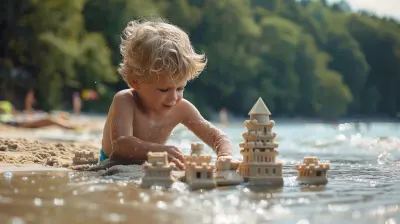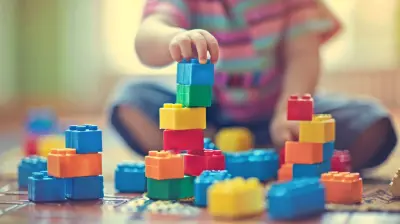How to Raise Responsible and Self-Reliant Kids
16 June 2025
Let’s be real—raising kids is hard. But raising responsible and self-reliant kids? That’s next level. You’re not just feeding and clothing a tiny human; you’re shaping someone who can eventually survive (and thrive) without you. Sounds intimidating, right?
Relax. You don’t need to have it all figured out today. But if you're someone who wants their kids to be capable, confident, and make good choices even when you're not around (heck yes!), then you’re in the right place.
In this guide, we’ll unpack practical, real-life strategies to help you build responsibility and independence in your child from a young age—without losing your mind or becoming a drill sergeant.
Why Responsibility and Self-Reliance Matter
Let’s start with the “why” before we jump into the “how.”Raising responsible and self-reliant kids isn’t just about making sure they can do their laundry or pack their lunches by age 10. It’s about helping them develop life skills, emotional maturity, and decision-making abilities that will carry them through their entire lives.
Think about it—do you want your 25-year-old still calling you to ask how to boil pasta or manage their bank account? Probably not.
When kids learn these traits early, they become better problem-solvers, more resilient under pressure, and overall more capable adults. It’s the gift that keeps on giving.
Start Early—Like, Toddler Early
You don’t need to wait until your kids are teenagers to teach responsibility. Actually, the earlier you start, the easier it is. Toddlers love to help. (Sure, their “help” might mean spilling water everywhere while trying to water plants, but hey, it’s a start.)Toddlers and Preschoolers Can:
- Put their toys away- Help feed pets
- Throw away trash
- Wipe up small messes
At this age, it’s all about building habits and modeling behavior. They won’t do it perfectly—and that’s okay. The point is to get them involved and teach them that they’re capable.
Teach by Example
Kids are sponges. They absorb everything—the good, the bad, and the “I probably shouldn’t have said that.” If you want responsible kids, show them what responsibility looks like.Let them see you follow through on commitments, apologize when you mess up, and manage your own time and tasks well. If you forget to pay a bill or misplace your keys, don’t just brush it off—talk about it. “I was rushing and didn’t double-check my calendar. That’s on me.”
Being transparent about your own struggles helps your kids learn that responsibility isn’t about being perfect—it’s about being accountable.
Give Them Real Responsibilities (Not Just Chores)
There's a difference between mindless chores and meaningful responsibility. Yes, taking out the trash is helpful, but what really builds character is giving your child tasks that involve decision-making and follow-through.For example:
- Let them plan part of the weekly menu (and help grocery shop for it)- Put them in charge of packing their own school lunch
- Have them manage a small allowance to budget their wants and needs
These tasks make them feel capable and trusted. They’re not just “helping”—they’re contributing.
Let Them Fail (Seriously, Let It Happen)
Okay, this one’s tough—but it’s crucial.We all want to protect our kids from disappointment and failure. But if you always swoop in to save them—finish their homework, replace the lunch they forgot, or fix every mistake—they’ll never learn to problem-solve on their own.
Sometimes the best teacher is a little stumble.
Forgot their homework? Let them deal with the consequences. Ruined their shirt because they didn’t follow the laundry instructions? Now they know why those tags exist.
It’s tempting to rescue, but remember—short-term struggle builds long-term strength.
Practice Problem-Solving Together
When kids come to you with a problem, resist the urge to jump in with a solution. Instead, try asking:- “What do you think would work?”
- “Have you had a situation like this before?”
- “What’s one idea you could try?”
It’s like building a muscle—the more practice they get thinking through situations, the stronger their decision-making skills become.
This also boosts their confidence because they’re learning they can figure stuff out on their own. And let’s face it, we all like feeling in control.
Set Boundaries and Stick to Them
Structure is a huge part of building responsibility. Kids feel safer and more capable when they know the boundaries—and when those boundaries don’t shift at random.If screen time ends at 8:00 p.m., it ends at 8:00 p.m.—even if they flash those puppy-dog eyes. Being consistent helps them understand that actions have consequences and routines matter.
You’re not being a mean parent; you’re being a guide. Think of yourself as the guardrails on a winding road—there to keep them on track while still giving them room to drive.
Encourage Critical Thinking and Independence
As your child grows, so should their independence. That means letting them make more decisions—about their time, their academics, their social life.Now, that doesn’t mean you let them skip school or eat ice cream for dinner. But it’s okay to let them choose how to organize their day or manage their time between homework and play.
Give them options and allow natural consequences to guide their learning. It's all about training them to think before they act, not just follow rules blindly.
Celebrate Effort More Than Results
If you only focus on the outcome (“You got an A! You're so smart!”), your child may become afraid to try—and fail.Shift the praise to the effort:
- “You worked really hard on that project.”
- “I noticed how you stayed focused even when it got tough.”
- “That was thoughtful of you to help your sister clean up.”
Acknowledging effort shows your child that responsibility isn’t about perfection—it’s about persistence.
Build a Family Culture of Contribution
Here’s a mindset shift: your home isn’t a hotel. Everyone who lives there is a member of the team—including your kids.Create a family culture where everyone pitches in. That means shared responsibilities aren’t just “chores” but part of being a contributor to the household.
You can even make it fun. Use chore charts, turn on music while cleaning, or set family challenges. The goal is to make contribution part of the family identity—not a punishment.
Provide Opportunities for Leadership
Whether it’s leading the prayer before dinner, choosing the family board game for the night, or organizing a lemonade stand, give your child chances to lead.Leadership builds decision-making skills, responsibility, and confidence. It’s the perfect training ground for self-reliance.
Encourage them to take initiative—even in small ways. “What do you want to be in charge of this weekend?” can go a long way.
Don’t Forget Emotional Responsibility
Being responsible isn’t just about tasks—it’s also emotional. Help your child learn to manage their feelings, express them in healthy ways, and take responsibility for how they talk to others.Teach them phrases like:
- “I felt frustrated because…”
- “I could have handled that better.”
- “Next time, I’ll try to…”
Emotional maturity is a huge part of independence. You can’t be truly self-reliant unless you know how to deal with your own emotions.
Be Patient—This Is a Long Game
Here’s the honest truth: progress won't be linear. Some days your kid will act like a mini adult. Other days they'll lose their backpack, forget their homework, and cry because you peeled their banana wrong.It’s okay. Rome wasn’t built in a day—and neither is responsibility.
Keep showing up, keep modeling, keep guiding. Every little lesson builds a foundation for the incredible adult they’re becoming.
Final Thoughts
Raising responsible and self-reliant kids isn’t about perfection—it’s about consistency, trust, and knowing when to let go just a little. It’s a balancing act between support and freedom, guidance and independence.And guess what? You’re already doing better than you think.
Keep showing up. Keep having the hard conversations. And trust that with every chore completed, every decision made, your child is stepping closer to becoming the capable, confident adult they’re meant to be.
You’ve got this—and so do they.
all images in this post were generated using AI tools
Category:
Teaching ResponsibilityAuthor:

Liam Huffman
Discussion
rate this article
2 comments
Onyx McTavish
This article provides practical insights on fostering responsibility and self-reliance in children. The tips are straightforward and actionable, helping parents guide their kids toward independence while maintaining a supportive environment. A must-read for any proactive parent!
June 20, 2025 at 3:54 AM

Liam Huffman
Thank you for your kind words! I'm glad you found the tips helpful for fostering independence in children.
Logan McAndrews
What a wonderful and insightful article! It's so important to foster responsibility and independence in our children. Your practical tips and thoughtful approach truly empower parents to raise confident, self-reliant kids. Thank you for sharing these valuable insights with us!
June 16, 2025 at 3:14 AM

Liam Huffman
Thank you for your kind words! I'm glad you found the tips helpful. Empowering our children is so important!


